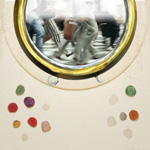 The very things I do so willingly in real life cripple me when they’re part of an assignment. While in this incapacitated state the very structure of my brain changes and I am suddenly filled with a sense of euphoric wonderment in the most mundane things. Everything becomes fascinating because fascination is a relative thing. This is why people are able to read the March 1983 edition of Highlights Magazine when they’re in the dentist office (a decent issue, don’t misunderstand).
The very things I do so willingly in real life cripple me when they’re part of an assignment. While in this incapacitated state the very structure of my brain changes and I am suddenly filled with a sense of euphoric wonderment in the most mundane things. Everything becomes fascinating because fascination is a relative thing. This is why people are able to read the March 1983 edition of Highlights Magazine when they’re in the dentist office (a decent issue, don’t misunderstand).
Right now I’m late for a deadline, and my agent has been making my phone ring. Therefore I’m standing on my chair looking out my single window, which is more like a porthole on an old ship. It’s pretty high up, so I have to stand on the chair to see outside. With my palms on the sill, I’ve watched for hours as people–or randoms, as I refer to them–scurry by. Indeed, I’ve spent so much time up at the window that I’ve taken to keeping snacks, usually gumdrops, stuck to the wall for convenience. Lick ’em and stick ’em. That’s good food. Raw bacon works too, even without licking.
There’s hardly a reason to get down, though this is an unusually wobbly chair, I must say. It hasn’t been the same since I tripped over it this morning. I awoke, as I usually do, with a scream. I have this recurring nightmare that I’m waking up in the morning screaming; it scares the hell out of me. And when I do wake up screaming it just perpetuates the nightmare. But still, it’s better to be awake than in that coffin of sleep. I hate going to sleep, I guess, is what it comes down to. I once dreamed that I had insomnia and it took me nine hours to wake up, except they weren’t dream hours. Not the kind that go by like minutes or seconds. They were real hours, and I had to sit there in my dream waiting until I got tired enough to wake up.
As my breath clouds the glass I wonder what the randoms are thinking about. Are they thinking about other randoms? Are they thinking about a particular color? Or perhaps they’re procrastinating like I am. And who would know? I’m deep in procrastination now, and it’s like being drugged. I’m pondering drugs when an entire memory surfaces from a lobe of my brain dedicated specifically to procrastination.
In college I roomed for a while with S., who was nice enough, even though he had a tendency to refer to people in the third person neutral. Probably because of this he didn’t have close acquaintances, but I never had any semantic hang-ups. S. was also heavily into drugs, but not the usual kinds. He liked to experiment with his own drugs. He designed them using chemicals he’d appropriated from the lab, and he was good too, as chemists go. After one of his binges I once found him face-down in the empty shower stall with a section of two-by-four clenched firmly in his jaw. His teeth were embedded so deep in the wood that it took us nearly a half-hour to remove the damned thing. But he was on the recovery path by the time we became roommates, and his most unfortunate performances were behind him. Mine were just beginning however, as illustrated on the night I discovered “Godzilla.” S. had cleverly decided to store this substance in an old orange juice container in the fridge. I couldn’t have foreseen the visitations that would await me that night, but it was something I would never be able to forget afterward: the horror of being hopped-up on Godzilla. Why “Godzilla?” To put it simply, it’s because there were three primary side-effects caused by the ingestion of this substance: The first was that it made you feel like a giant by causing your surroundings to shrink away. Second, it caused a burning sensation in your throat, so you felt you were breathing fire. And last–and most importantly–you felt desperately compelled to destroy Tokyo.
Which reminds me of my high school gym teacher’s thundering thighs. I loathed and feared this man because he was an immense, bald Mr. Clean-type creature genetically designed to promote competitive group activity. He was toxic with enthusiasm, and would try to rally us by clapping his giant catcher’s mitt-sized palms and shouting, “okay, troops.” Hiding behind the bleachers I would watch him pacing back and forth, and it was impossible to pry my eyes off the veins running down his left calf because they–the veins, mind you–were as thick as my upper arm. How could this be? Was he wearing a secret tourniquet around his upper thigh? The thought brought on one of those involuntary faces you make when you spontaneously think of driving a pin through your eyeball. I recall one day when I was in formation with the other troops, and my Gym teacher caught me wincing, and he immediately pounded over and yelled in my face like a foghorn. I think I had to do nine thousand laps as a result, but all I could think about was that his breath smelled like toothpaste when he said the word “perimeter.”
Obviously I think next about the balls in my toothpaste. Last night I looked down at my toothbrush and found the sticky dollop riddled with the little orange balls. What a welcome change, I thought, to what is, typically, such a bland and uniform material. But I could not help but wonder what they were, these tiny spheres. Flavor crystals, perhaps? Or retsin? Crunch berries? There was simply no telling.
As I’m standing here wondering all this, the earthquake hits, and I instinctively take my surfer position and ride it out on top of my chair. They’re onto me, I think.
I get off the chair and consider it for a second. I got it from my ex-girlfriend. It feels strange to have this remnant still, especially since it’s such a flimsy remnant. The chair. The inert chair from an old relationship. In my experience there’s no drama in a chair unless you’re in the act of tripping over it. It certainly doesn’t speak of the pain at the end of a relationship. If it were stained from top to bottom in blood, now that would be a real token. Something you could tell your friends about at parties, and they would all nod and understand and regard the chair with a quiet respect. The chair survives the couple, like a cockroach in its aftermath.
I’m thinking of getting another chair, actually, right after I finish my assignment.
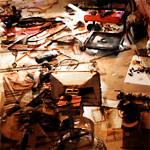 I’ve been redistributing the world around me piece by piece. The idea first occurred to me as a practical solution to the observation that I simply owned too many things. But for one as reclusive as I, the practice of divesting from material goods is fraught with difficulty, particularly when faced with the possibility of having to interact with people. Yet how is one to one rid oneself of extraneous possessions without resorting to arson?
I’ve been redistributing the world around me piece by piece. The idea first occurred to me as a practical solution to the observation that I simply owned too many things. But for one as reclusive as I, the practice of divesting from material goods is fraught with difficulty, particularly when faced with the possibility of having to interact with people. Yet how is one to one rid oneself of extraneous possessions without resorting to arson?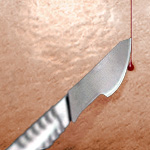 People in Virginia, you tell them you’re moving to California and they all chuff and get that same look in their eye. I call it the, “So sleeping with your own family members ain’t good enough for ya now?” look. According to Virginians, we on the west coast all lead lives of frivolity and perversion. I say fine, let them think that. There’s no point in arguing with someone whose idea of couture is possessing lawn furniture that will accommodate their gigantic asses.
People in Virginia, you tell them you’re moving to California and they all chuff and get that same look in their eye. I call it the, “So sleeping with your own family members ain’t good enough for ya now?” look. According to Virginians, we on the west coast all lead lives of frivolity and perversion. I say fine, let them think that. There’s no point in arguing with someone whose idea of couture is possessing lawn furniture that will accommodate their gigantic asses. That night I had to sleep over at her house, my mean sitter Theresa told me that the clanking sounds outside were those of the Night Deliveryman, a shadowy figure who scaled tenement walls in search of children. This explanation was corroborated by her husband Raymond, whose principal function was to torment me with flipped eyelids. What they lacked in imagination I more than made up for. To me the Night Deliveryman had a giant head, like an upturned wheelbarrow, and small silvery slit-eyes, and it walked eight feet tall on eight black spindly legs. Its flesh was leathery and dry, and it clung to its skull in tatters. Other details were more intimate: a whisper close to my ear, “Hey…” repeated endlessly, “hey…” and I remember trying to drown it out with my pillow as I lay on the hard parquet floor in the pitch-dark hallway. “… hey…” Still, my kid logic said it was better to be in the hallway than in their room: the Night Deliveryman would have to clamber up through their window before it could get to me.
That night I had to sleep over at her house, my mean sitter Theresa told me that the clanking sounds outside were those of the Night Deliveryman, a shadowy figure who scaled tenement walls in search of children. This explanation was corroborated by her husband Raymond, whose principal function was to torment me with flipped eyelids. What they lacked in imagination I more than made up for. To me the Night Deliveryman had a giant head, like an upturned wheelbarrow, and small silvery slit-eyes, and it walked eight feet tall on eight black spindly legs. Its flesh was leathery and dry, and it clung to its skull in tatters. Other details were more intimate: a whisper close to my ear, “Hey…” repeated endlessly, “hey…” and I remember trying to drown it out with my pillow as I lay on the hard parquet floor in the pitch-dark hallway. “… hey…” Still, my kid logic said it was better to be in the hallway than in their room: the Night Deliveryman would have to clamber up through their window before it could get to me.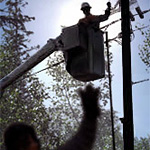 When I awake there’s shouting, and for a moment it’s 1983, and I’m back at the Institute holding an oily rag in one hand and a canteen of gasoline in the other. Then I remember that they never got any charges to stick, and I shake the remnants of sleep from my skull.
When I awake there’s shouting, and for a moment it’s 1983, and I’m back at the Institute holding an oily rag in one hand and a canteen of gasoline in the other. Then I remember that they never got any charges to stick, and I shake the remnants of sleep from my skull. Having returned from my interpretive dance motion capture session in Brussels, and with an extra free week on my hands still, I have decided to spend my time on a new campaign to urge the medical community to perform a new kind of cosmetic surgery. This is the text of my letter.
Having returned from my interpretive dance motion capture session in Brussels, and with an extra free week on my hands still, I have decided to spend my time on a new campaign to urge the medical community to perform a new kind of cosmetic surgery. This is the text of my letter.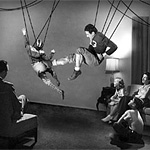 Back in the early forties–1946 was when it all started for us–kung fu by wire was an art form in its infancy. In fact it’s fair to say that it wasn’t yet an art form, but rather a humiliating form of family torture. At least that’s how I remember it.
Back in the early forties–1946 was when it all started for us–kung fu by wire was an art form in its infancy. In fact it’s fair to say that it wasn’t yet an art form, but rather a humiliating form of family torture. At least that’s how I remember it.